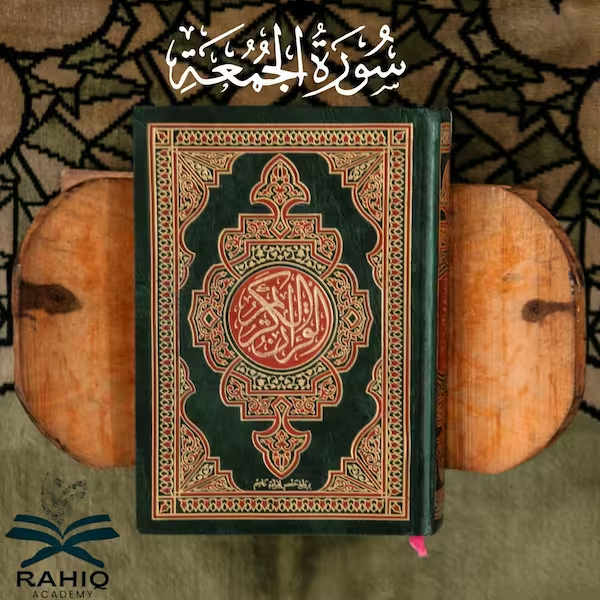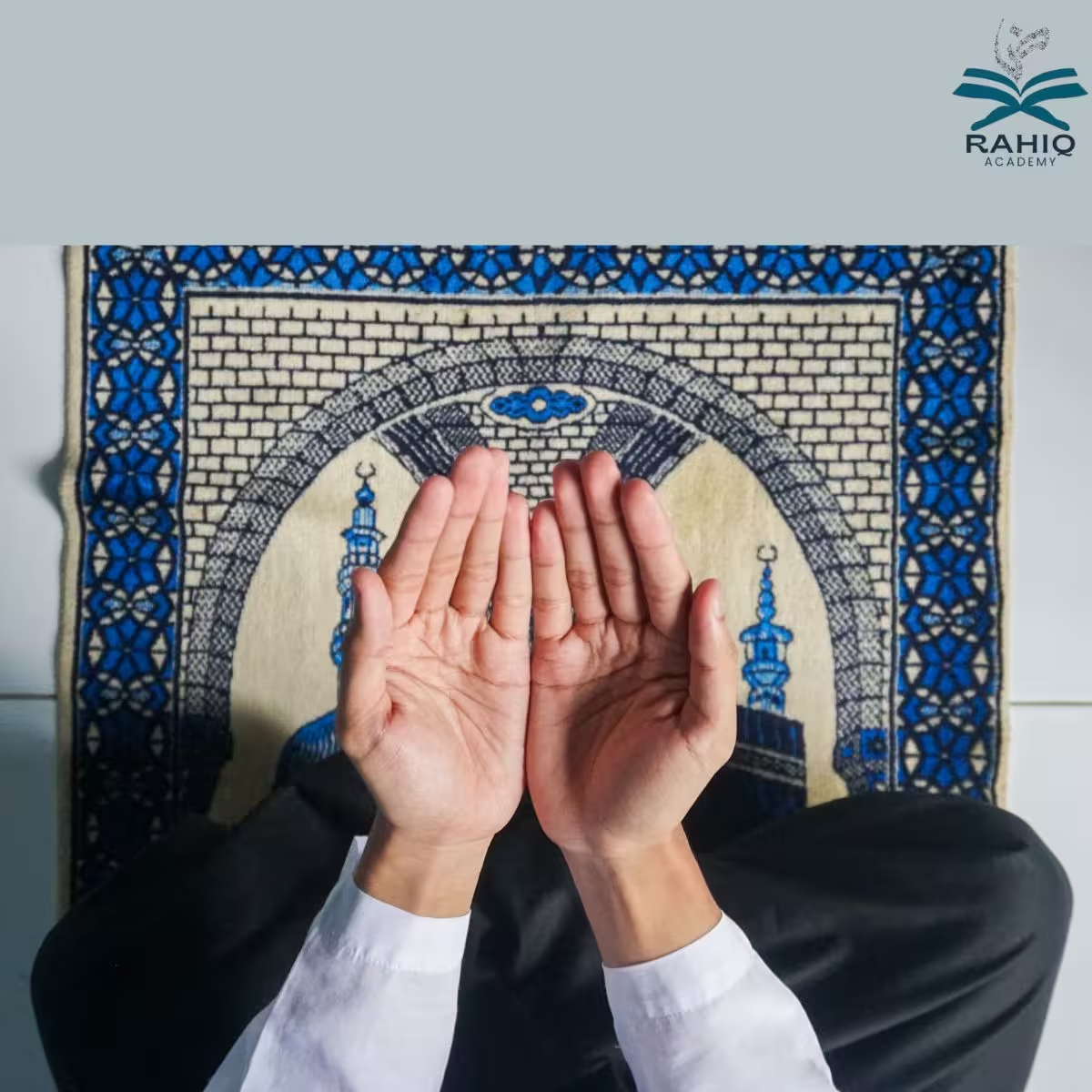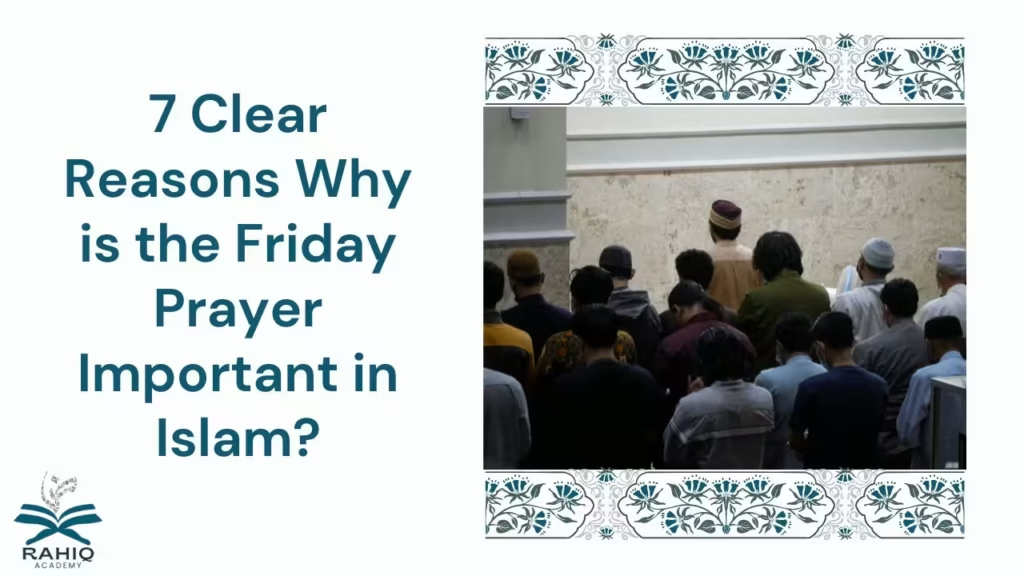Why is the Friday prayer important in Islam? For millions, Jumu’ah isn’t just another prayer—it’s a weekly lifeline. But what makes it so vital? From Quranic commands to community unity, Friday prayer weaves faith into life’s fabric. Imagine: angels recording your name, sins forgiven, and hearts recharged—all in two rak’ahs. Then there’s the sermon: a moment to pause, reflect, and grow. So why skip it? Discover 7 Quran-backed reasons, the unique structure, and how Jumu’ah transforms ordinary Fridays into spiritual milestones.
What is the Definition of Friday Prayer (Jumu’ah)?
Here’s the Definition of Friday Prayer (Jumu’ah). It is the weekly prayer Muslims perform each Friday in place of the usual Dhuhr prayer, making it a unique event each week. The Arabic term “Jumu’ah” means “gathering,” highlighting its importance as a communal act of worship.
The Imam delivers a sermon, known as Khutbah, before leading the prayer. The Quran urges believers to attend, showing its high importance. This gathering unites the community, renews the bond with Allah, helps believers refocus their hearts, and provides an opportunity to reflect and seek forgiveness.
Why is the Friday prayer important in Islam? Because it combines worship, reflection, and unity in a way no other prayer does. Jumu’ah is a combination of spiritual guidance and collective prayer, fostering unity and community spirit, making it a fundamental part of every Muslim’s spiritual life.
7 Reasons Friday Prayer Matters: Importance in Islamic Tradition
In Islamic tradition, Friday, known as “Yawm al-Jumu’ah,” holds a special place as a day of collective worship and reflection. The Friday prayer, or Jumu’ah, is not just a weekly habit. It is a central part of Muslim spiritual life. Here are seven reasons highlighting its significance Importance in Islamic Tradition
- The Quran calls Muslims to stop work and attend Jumu’ah prayer, showing how serious this day is in Islam.
- Muslims unite in mosques, fostering community bonds and shared faith.
- Jumu’ah gives Muslims a chance to stop, think, and really ask for forgiveness with a sincere heart.
- The Khutbah guides on moral and social issues, enhancing understanding.
- Friday is believed to be a day when prayers are more likely to be accepted.
- Significant events, like the creation of Adam, are associated with Friday, adding to its sanctity.
- Regular attendance reminds Muslims of life’s purpose and the afterlife.
Embracing the Friday prayer strengthens one’s connection with Allah and the Muslim community, making it an essential practice in Islam. Why is the Friday prayer important in Islam? It brings weekly reflection, unity, and spiritual renewal.
Quranic Verses on Friday Prayer: What the Quran Says and Why It Matters

For Muslims wondering why the Friday prayer is important in Islam, the answer begins with the Quran itself. This weekly prayer is not just a tradition—it is a direct command and a reminder of the deep Importance in Islamic Tradition. The following Quranic verses explain its value, its timing, and its role in a believer’s life.
Surah Al-Jumu’ah (62:9)
- Friday prayer revolves around the central verse of Surah Al-Jumu’ah (62:9). “O you who believe!” it exclaims. Hurry to remember Allah and stop trading when the call for prayer is given on Friday. You would gain more from that if you knew.. This verse gives a clear directive. The word “hurry” means don’t delay. The phrase “leave trade” means to stop worldly work. Together, they show that prayer takes full priority.
- The verse is not symbolic—it’s an obligation. It makes clear that Friday prayer is not optional. It carries the same weight as other required acts in Islam.
- By telling Muslims to leave trade, the verse connects faith with discipline. It means that even businesses must pause for prayer. Part of the message of Islam is to strike a balance between employment and devotion.
Surah Al-Jumu’ah (62:10)
- follows with another guide: “Then when the prayer is finished, disperse through the land and seek Allah’s bounty, and remember Allah much, that you may be successful.”This verse shows that while prayer comes first, earning a living is still important. But it must come after worship, not before.
- These verses give a full plan for Friday: pause work, pray in congregation, then return to your duties. It’s a weekly reset of both spirit and focus.
- The structure is simple yet effective: pause, pray, return, remember. This keeps believers grounded in both faith and daily life.
- The two verses also reflect how Islam links community worship with personal responsibility. You pray together, then go earn your living—but always with Allah in mind.
- Friday prayers are not merely customary; they are closely linked to recollection. The Khutbah (sermon) and prayer together refresh the heart and mind.
- These Quranic verses help make Jumu’ah a habit that brings consistency, reflection, and unity.
- When followed sincerely, they help Muslims live with the balance between soul and survival, faith and work.
These Quranic commands make Jumu’ah a foundation in Islam. They teach believers to prioritize prayer, value time, and stay connected to both faith and community. Why is the Friday prayer important in Islam? Because it’s not a cultural habit; it’s a clear act of worship written in the Quran.
Discover Jumu’ah: How is the Friday Prayer Different from Other Daily Prayers?
Also, learn why is the Friday prayer important in Islam for community connection.
Friday prayer (Jumu’ah) is more than a midday prayer, it has a structure, purpose, and spiritual value that stand apart. To fully understand why is the Friday prayer important in Islam, you need to see how it differs from other daily prayers. These key points explain that difference clearly and in detail
How Jumu’ah Prayer Differs from Daily Salat in Islam?
- Friday’s Jumu’ah prayer is indeed a unique weekly event. In contrast, the five daily Salat prayers happen every single day, specifically from dawn until night.
- Furthermore, gathering for Jumu’ah at the mosque is required, particularly for men. However, daily prayers offer more flexibility; consequently, they can be prayed alone if necessary.
- Additionally, a major difference involves the sermon. Specifically, Jumu’ah always includes a mandatory Khutbah before the prayer begins, primarily for guidance. Yet, daily prayers consist only of prayer, thus lacking this teaching element.
- Trade and business pause, Muslims must leave work or business activities when the call to Jumu’ah is heard. No other prayer includes this command
- Regarding structure, the Jumu’ah prayer itself is shorter, typically containing just two Rak’ahs, or units. Importantly, these two units replace the usual four Rak’ahs of the Dhuhr prayer on other days.
- Therefore, Jumu’ah strongly emphasizes uniting the community as well as receiving shared instruction. Daily Salat, meanwhile, mainly nurtures the continuous, personal bond between an individual and Allah.
- Finally, special preparations highlight Jumu’ah’s significance. For instance, a full bath (Ghusl) plus wearing nice clothes are encouraged beforehand. Whereas for daily prayers, standard washing (Wudu) usually suffices
Through the Quranic command and the teachings of the Prophet Muhammad (PBUH), Jumu’ah is emphasized as a time for communal worship, reflection, and renewal. Why is the Friday prayer important in Islam? Because it strengthens the bond between the individual, the community, and Allah.
How is the Friday Prayer Different from Other Daily Prayers?
Understanding this helps highlight its unique role in faith and practice. Why is the Friday prayer important in Islam? Because Jumu’ah is a cornerstone of Islamic practice, making it one of the most spiritually enriching moments in the life of a Muslim.
This combination of spiritual rewards, community unity, and personal reflection is why Jumu’ah is celebrated and observed by millions of Muslims worldwide.
Key Differences Between Jumu’ah and Other Daily Prayers
| Feature | Jumu’ah (Friday Prayer) | Daily Prayers (Salat) |
| Frequency | Once a week, on Friday | Five times every day |
| Congregation | Mandatory, especially for men | Can be prayed alone if needed, though a congregation is encouraged |
| Sermon (Khutbah) | Includes a mandatory sermon (usually two parts) before the prayer | No sermon included |
| Number of Rak’ahs (Units) | Two Rak’ahs | Varies: Fajr (2), Dhuhr (4), Asr (4), Maghrib (3), Isha (4) |
| Replaces Daily Prayer? | Replaces the Dhuhr (midday) prayer for those who attend | N/A |
| Main Emphasis | Community gathering, unity, shared guidance, weekly spiritual refresh | Continuous, personal connection and communication with Allah throughout the day |
| Special Preparations | Encouraged: Full bath (Ghusl), wearing clean/best clothes, perfume (for men) | Standard ablution (Wudu) is required |
| Obligation Level | Obligatory for adult, resident men without a valid excuse | Obligatory for all adult Muslims |

8 Key Parts in the Structure of the Prayer: What Makes Jumu’ah Special?
Jumu’ah, the Friday prayer, is one of the most spiritually significant practices in Islam. This special prayer is distinct from the daily five prayers in both structure and purpose.
Why is the Friday prayer important in Islam? Let’s break down the key elements of Jumu’ah and explore why it’s essential for spiritual renewal and community connection. Let’s break down the key elements of Jumu’ah and explore why it’s essential for spiritual renewal and community connection.
1. Timing and Replacement of Dhuhr
- Jumu’ah prayer takes place every Friday at midday, replacing the regular Dhuhr prayer.
- This timing makes it an accessible moment for Muslims, even during the workday.
- It’s a spiritual pause, providing an opportunity to reconnect with faith during daily routines.
2. Preparation and Purity
- Before attending Jumu’ah, Ghusl, or a thorough ritual bath, is recommended for Muslims, signifying both spiritual and bodily cleanliness.
- Dressing in clean, best clothes and applying fragrance is also recommended.
- These preparations highlight the importance of presenting oneself in the best possible manner for such a sacred occasion.
3. The Adhan: The Call to Gather
- The prayer begins with the adhan (call to prayer), signaling the time for gathering.
- A second adhan is usually heard just before the Imam delivers the sermon.
- This call acts as a reminder for Muslims to pause their daily activities and gather in unity for worship.
4. The Khutbah: The Imam’s Sermon
- The Imam delivers two parts of the sermon, known as the khutbah.
- The first part focuses on faith and duty, while the second part includes supplications and final guidance.
- The Imam’s words are designed to offer spiritual nourishment and reflection for the congregation.
- During the short pause between the two khutbahs, Muslims reflect on the teachings, prepare their hearts for the prayer, and make personal supplications.
- It’s a moment of quiet reflection before the transition to communal worship.
5. Attentive Listening: A Sign of Respect
- The congregation needs to remain silent and attentive during the khutbah.
- This silence shows respect not only for the Imam but also for the sacredness of the moment.
- Attentively listening ensures that Muslims absorb the guidance shared and prepare spiritually for the prayer.
6. The Iqamah: Transitioning to Prayer
- Once the khutbah concludes, the iqamah is recited, signaling the transition to the prayer.
- The congregation reinforces the oneness of the Muslim community by standing in rows, shoulder to shoulder.
- This shared experience of worship strengthens the sense of collective responsibility and belonging.
7. The Two Rak’ahs: The Prayer Itself
- The prayer consists of two rak’ahs (units), led by the Imam.
- Despite being shorter than the usual four rak’ahs of Dhuhr, Jumu’ah is of higher spiritual value, particularly because it is performed in congregation.
- The significance of the prayer is increased by the believers’ oneness in worship.
8. Closing the Weekly Gathering
- The Jumu’ah prayer concludes with the two rak’ahs.
- This time offers an opportunity for spiritual renewal—believers reflect on their week, seek forgiveness for past mistakes, and set intentions for the week ahead.
- Jumu’ah is a profoundly spiritual event that enhances community ties and personal faith in addition to being a prayer.
By following the specific structure, from preparation and purification to the shared prayer and reflection, believers reconnect with Allah and their fellow Muslims. Why is the Friday prayer important in Islam? Because through this powerful weekly reset, Jumu’ah becomes more than a ritual; it is a cornerstone of Islamic practice, promoting spiritual growth, unity, and devotion.
12 Recommended Sunnah Acts for Friday
To fully embrace the blessings of Friday, several practices are recommended based on the Sunnah (tradition) of Prophet Muhammad (peace be upon him). These acts enhance the spiritual experience and demonstrate reverence for this special day. Why is the Friday prayer important in Islam? Because it brings meaning to these practices and connects them to the weekly worship that strengthens faith and unity.
Recommended Acts and Their Meanings
| Recommended Act | Brief Description |
| Ghusl (Ritual Bath) | Performing a full ritual bath before attending the prayer. |
| Wearing Best/Clean Clothes | Dressing in one’s finest and cleanest attire. |
| Using Perfume (for men) | Applying fragrance (specifically recommended for men attending the mosque). |
| Using Siwak (Teeth Cleaning) | Cleaning the teeth, traditionally with a miswak stick. |
| Going Early to the Mosque | Arriving at the mosque well before the sermon begins to gain maximum reward. |
| Walking to the Mosque | Walking to the prayer if feasible, as each step carries a reward. |
| Reciting Surah Al-Kahf | Reading end of Chapter 15 and the first 3 pages of chapter 16 of the Quran sometime during Friday. |
| Sending Blessings on the Prophet | Frequently sending Salawat (prayers and peace) upon the Prophet Muhammad (pbuh). |
| Making Abundant Du’a (Supplication) | Engaging in plentiful personal supplication, especially seeking the special hour. |
| Cutting Nails | Trimming nails as part of personal hygiene is encouraged on Friday. |
| Praying Nafl (Voluntary) Prayer | Offering optional prayers upon entering the mosque before the Khutbah starts. |
| Listening Attentively to Khutbah | Maintaining silence and paying full attention during the sermon. |
Why Friday Prayer Requires Preparation?
This collection of recommended practices highlights that Jumu’ah is treated with special reverence, requiring both physical and mental preparation.
Acts like purification, wearing fine clothes, arriving early, and maintaining silence during the sermon collectively frame the Friday prayer not just as a routine obligation, but as a significant weekly event, akin to a festival, demanding deliberate effort and respect.
Why is the Friday prayer important in Islam? Because this level of care and preparation reflects its deep spiritual role. This preparation enhances the spiritual readiness of the individual and contributes to a more focused and dignified communal atmosphere.
Why Is the Friday Prayer Important in Islam?
The Friday prayer, or Jumu’ah, is not just a weekly gathering—it’s one of the most important acts in a Muslim’s spiritual life. Muslims pause their daily routine to gather in the mosque every Friday across countries, languages, and generations. It’s a time for reflection, community bonding, and spiritual growth.
Why is the Friday Prayer Important in Islam?
1. It Is Commanded in the Quran
The significance of Friday prayer is made abundantly evident in the Quran. When called, Muslims are instructed to quit their jobs and attend Jumu’ah prayer by Surah Al-Jumu’ah (62:9):
يَـٰٓأَيُّهَا ٱلَّذِينَ ءَامَنُوٓاْ إِذَا نُودِيَ لِلصَّلَوٰةِ مِن يَوۡمِ ٱلۡجُمُعَةِ فَٱسۡعَوۡاْ إِلَىٰ ذِكۡرِ ٱللَّهِ وَذَرُواْ ٱلۡبَيۡعَۚ ذَٰلِكُمۡ خَيۡرٞ لَّكُمۡ إِن كُنتُمۡ تَعۡلَمُونَ
“O you who believe! On Friday, when the call to prayer is given, get up from your work and instantly remember Allah. It would be better for you if you just knew.
Ignoring it without a valid reason isn’t just a missed opportunity—it’s disobedience.
This is not a suggestion; it’s a direct command that highlights the priority of Jumu’ah in Islamic practice.
2. It Replaces the Regular Dhuhr Prayer
- Jumu’ah is the only prayer in Islam that replaces a daily obligatory prayer.
- Instead of four rakats for Dhuhr, Muslims pray two rakats in congregation, preceded by the khutbah (sermon).
- This distinction emphasizes the significance of the day and the prayer.
- This isn’t a simple swap. It shows that Friday has been set apart for a deeper purpose.
3. A Weekly Opportunity for Forgiveness
Sincere Jumu’ah attendance results in the forgiveness of small transgressions committed during the week, according to reliable hadiths.
قَالَ النَّبِيُّ صلى الله عليه وسلم “ لاَ يَغْتَسِلُ رَجُلٌ يَوْمَ الْجُمُعَةِ، وَيَتَطَهَّرُ مَا اسْتَطَاعَ مِنْ طُهْرٍ، وَيَدَّهِنُ مِنْ دُهْنِهِ، أَوْ يَمَسُّ مِنْ طِيبِ بَيْتِهِ ثُمَّ يَخْرُجُ، فَلاَ يُفَرِّقُ بَيْنَ اثْنَيْنِ، ثُمَّ يُصَلِّي مَا كُتِبَ لَهُ، ثُمَّ يُنْصِتُ إِذَا تَكَلَّمَ الإِمَامُ، إِلاَّ غُفِرَ لَهُ مَا بَيْنَهُ وَبَيْنَ الْجُمُعَةِ الأُخْرَى ”.
Those who properly conduct ablution, attend Friday prayer, listen intently, and refrain from idle chatter will have their sins from the previous Friday forgiven, according to the Prophet Muhammad (peace be upon him).
As a result, Jumu’ah becomes a weekly spiritual refresh.
4. The Khutbah Provides Timely Guidance
- Before the prayer, the Imam delivers a sermon.
- The Friday sermon is not symbolic, it has a purpose.
- It teaches lessons from the Quran and Sunnah, discusses current affairs, and serves as a reminder of Islamic ideals to the community.
- It is a moment to hear something relevant, useful, and spiritually grounding.
- The khutbah emphasizes its religious significance by substituting two rakats for the standard prayer.
- The Khutbah provides spiritual advice and Quranic guidance, helping believers align their lives with Islamic principles. Why is the Friday prayer important in Islam? Because this sermon reminds the heart and mind of what truly matters each week.
5. The Day of Adam’s Creation and Judgment
Friday is historically significant. Allah created Adam (PBUH) on Friday, and it’s the day Adam entered and left Paradise. According to Hadith, the Day of Judgment will also fall on a Friday, giving this day profound spiritual weight
وَعَنْ أَبِي هُرَيْرَةَ رَضِيَ اللَّهُ عَنْهُ قَالَ: قَالَ رَسُولُ اللَّهِ صَلَّى اللَّهُ عَلَيْهِ وَسَلَّمَ: «خَيْرُ يَوْمٍ طَلَعَتْ عَلَيْهِ الشَّمْسُ يَوْمُ الْجُمُعَةِ فِيهِ خُلِقَ آدَمُ وَفِيهِ أُدْخِلَ الْجَنَّةَ وَفِيه أخرج مِنْهَا وَلَا تقوم السَّاعَة لَا فِي يَوْم الْجُمُعَة» . رَوَاهُ مُسلم
Abu Huraira reported God’s Messenger as saying, “The best day on which the sun has risen is Friday; on it Adam was created, on it he was brought into paradise, on it he was expelled from it, and the last hour will take place on no day other than Friday.”
Muslim transmitted it. (Mishkat al-Masabih 1356)
6. The Prophet Emphasized It Strongly
The Prophet Muhammad (peace be upon him) never missed Jumu’ah. He delivered the khutbah himself and described Friday as “the best of your days.” He also warned that neglecting Jumu’ah could lead to spiritual consequences. In one hadith, he said:
النَّبِيِّ صلى الله عليه وسلم قَالَ “ مَنْ تَرَكَ ثَلاَثَ جُمَعٍ تَهَاوُنًا بِهَا طَبَعَ اللَّهُ عَلَى قَلْبِهِ ” .
“Whoever leaves three Jumu’ahs without an excuse, Allah will place a seal over his heart.” (Sunan Abu Dawood)
That seal is a warning of spiritual disconnect and loss of guidance.
7. It Strengthens Muslim Unity
- In one location, Jumu’ah is the only weekly prayer that unites the Muslim community.
- Muslims from diverse backgrounds gather to pray side by side, which breaks the routine of isolation and reinforces the strength of the Muslim Ummah.
- It serves as a weekly reminder that all believers are part of a global community, connected by faith.
- It’s the only congregational prayer that requires attendance and public assembly during the workday.
- This weekly gathering builds social bonds, offers support, and renews the sense of shared responsibility.
8. There Is a Special Hour for Answered Prayers
- The Prophet (peace be upon him) said that on Fridays, there is a specific hour when any dua (supplication) made is accepted.
- Many scholars believe this occurs during the last hour before Maghrib.
- Attending Jumu’ah and making dua in this window is a chance not to miss.
9. Even Angels Take Record
It is said that on Fridays, angels stand at mosque doors. They write the names of those who come early, one by one, until the khutbah begins. After that, they close their books and join the congregation.
وَعَنْ أَبِي هُرَيْرَةَ رَضِيَ اللَّهُ عَنْهُ قَالَ: قَالَ رَسُولُ اللَّهِ صَلَّى اللَّهُ عَلَيْهِ وَسَلَّمَ: «إِذَا كَانَ يَوْمُ الْجُمُعَةِ وَقَفَتِ الْمَلَائِكَةُ عَلَى بَابِ الْمَسْجِدِ يَكْتُبُونَ الْأَوَّلَ فَالْأَوَّلَ وَمَثَلُ الْمُهَجِّرِ كَمَثَلِ الَّذِي يُهْدِي بَدَنَةً ثُمَّ كَالَّذِي يُهْدِي بَقَرَةً ثُمَّ كَبْشًا ثُمَّ دَجَاجَةً ثُمَّ بَيْضَةً فَإِذَا خَرَجَ الْإِمَامُ طَوَوْا صُحُفَهُمْ ويستمعون الذّكر.
When Friday comes, the angels stand at the door of the mosque recording the people in the order of their arrival. Those who go out in the midday heat1 are treated like him who offers a sacrificial animal, 2 next like one who offers a cow, next a sheep, next a hen, next an egg. Then, when the imam comes out, they fold up their sheets and listen to the mention of God.
This shows that not only is attendance recorded, but arriving early also brings spiritual reward.
10. Shorter Prayer, Greater Impact
- Jumu’ah prayer is shorter than Dhuhr but carries more weight.
- The format is intentionally brief to encourage attendance and reflection.
- You spend less time but gain more reward when you show up on time, listen fully, and pray with sincerity.
11. A Habit That Shapes the Week
- Jumu’ah gives Muslims structure. It resets your mind, recharges your heart, and reminds you what matters.
- It interrupts work, noise, and distractions to bring you back to your Creator and your values.
- A consistent Jumu’ah routine helps keep your spiritual priorities in check all week long.
A Lifeline for Spiritual Growth
Jumu’ah is more than just another religious duty. It is an opportunity for personal reflection, forgiveness, and spiritual growth. Every Friday, Jumu’ah renews a Muslim’s relationship with Allah, strengthens their sense of community, and serves as a reminder of life’s true purpose.
Why is the Friday prayer important in Islam? Because it brings both the heart and the community together in worship and reflection. By attending Jumu’ah, Muslims not only fulfill a religious obligation but also take time to focus on their spiritual health. It’s a day for reflection, community bonding, and seeking Allah’s mercy. Whether you’re seeking forgiveness, strength, or simply a reminder of your faith, Jumu’ah offers a powerful way to grow spiritually and stay connected with the Ummah.
Summary
Now you know Why is the Friday prayer important in Islam?—it’s more than just two rak’ahs. It brings you closer to Allah, builds unity, and resets your week. Don’t miss the chance to live this weekly moment with meaning. Want to deepen your understanding? Start learning step by step with rahiqacademy.com. Their simple courses help you grow in faith—at your pace, wherever you are. Take that first step today.
FAQ’s
Q:Why is the Friday prayer important in Islam for community building?
A:Jumu’ah fosters unity, where Muslims gather to pray together, enhancing spiritual and social connections.
Q:What is the significance of the sermon during the Friday prayer?
A:The sermon during Jumu’ah offers valuable guidance, reminding Muslims of their duties, strengthening their faith, and encouraging moral living.
Q:Why is the Friday prayer important in Islam for personal reflection?
A:Jumu’ah gives Muslims the chance to pause, reflect on their actions, and renew their commitment to live by Islamic teachings.
Q:Why is the Friday prayer important in Islam for moral guidance?
A:The sermon addresses current issues, providing ethical direction and reminders of Islamic values.
Q:Why is the Friday prayer important in Islam for collective remembrance?
A:It emphasizes the communal aspect of worship, strengthening bonds among Muslims.
Q:Why is the Friday prayer important in Islam for personal discipline?
A:Regular attendance encourages punctuality, cleanliness, and mindfulness in daily life.




